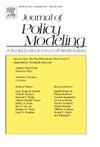食用油补贴改革对整个经济的影响以及对油棕榈树产业的补偿
IF 3.1
2区 经济学
Q1 ECONOMICS
引用次数: 0
摘要
本研究分析了食用油补贴改革的整体经济影响,采用两种模拟:完全取消补贴和对油棕行业的补偿。这项研究的重点是宏观经济变量、工业产出和就业。采用可计算一般均衡模型进行分析。研究发现,完全取消补贴会对宏观经济产生负面影响,导致经济增长略有下降。它还会对工业产出和就业产生负面影响。另一方面,将收入重新分配给油棕产业投资可以减轻这些不利影响,并进一步促进经济增长。重新分配提高了油棕产业的产量,减少了对劳动力的需求。对其他行业产出和就业的影响各不相同。取消食用油补贴是一个可行的选择,因为它的影响很小。它还建议补偿油棕产业,特别是独立的小农。本文章由计算机程序翻译,如有差异,请以英文原文为准。
The economy-wide impact of cooking oil subsidy reforms and compensation to the oil palm industry
This study analyses the economy-wide impact of cooking oil subsidy reforms using two simulations: complete subsidy removal and compensation for the oil palm industry. The study focuses on macroeconomic variables, industrial output, and employment. A Computable General Equilibrium model is used for analysis. The study found that complete subsidy removal leads to negative impacts on the macroeconomy, causing a slight decrease in economic growth. It also results in negative impacts on industrial output and employment. On the other hand, reallocating the revenue to the oil palm industry investment could mitigate these adverse effects, and further leads to an increase in economic growth. The reallocation improves the output of the oil palm industry and reduces its labour demand. The impacts on other industries' output and employment vary. Removing cooking oil subsidy can be a viable option because of its marginal impacts. It's also recommended to compensate the oil palm industry, especially independent smallholders.
求助全文
通过发布文献求助,成功后即可免费获取论文全文。
去求助
来源期刊

Journal of Policy Modeling
ECONOMICS-
CiteScore
6.20
自引率
11.40%
发文量
76
期刊介绍:
The Journal of Policy Modeling is published by Elsevier for the Society for Policy Modeling to provide a forum for analysis and debate concerning international policy issues. The journal addresses questions of critical import to the world community as a whole, and it focuses upon the economic, social, and political interdependencies between national and regional systems. This implies concern with international policies for the promotion of a better life for all human beings and, therefore, concentrates on improved methodological underpinnings for dealing with these problems.
 求助内容:
求助内容: 应助结果提醒方式:
应助结果提醒方式:


